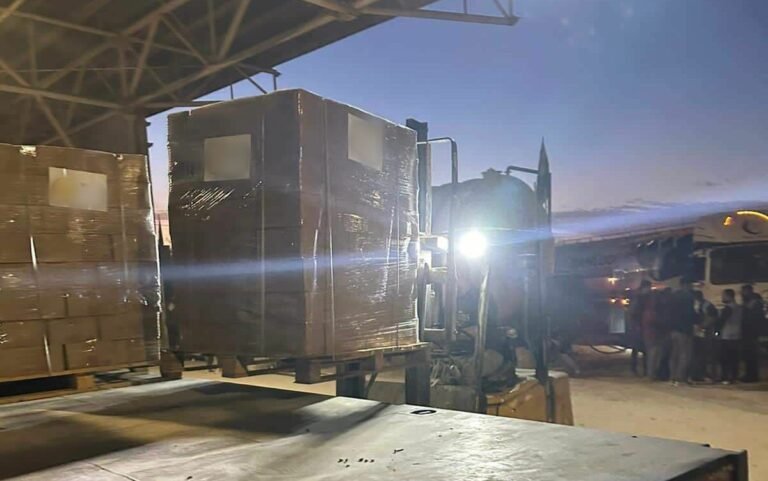While the logistics industry has stabilised from the shocks of the Covid era and returned to a more reliable situation, there are still challenges bearing down on the sector. Conflict between Israel and Gaza and the situation in Yemen threatening traditional shipping lanes through the Red Sea has forced logistic companies to take action to prevent supply chains from being disrupted.
With the recent crisis unfolding, Move One has opened its newest stations in Egypt and Gaza. In Cairo, the logistics company now runs a 5,500sqm distribution centre, which is solely focused on the receiving, packing and outward distribution of urgently needed food for the people of Gaza.
Within Gaza, they are the only international logistics company with personnel and facilities in operation, having leased and staffed a series of warehouses in southern Gaza, where under the current conditions of major fuel shortages, they are currently distributing food and aid via any means.
READ: Delivering amid disruption
Solutions for the supply chains
Specialising in shipping, handling, and delivering cargo, Move One delivers creative door-to-door international freight solutions; tax-exempt customs clearance management; bespoke field warehousing; and final mile delivery in downrange/security-fluid contexts, utilising our own offices and field teams.
Move One has supported cargo delivery needs of the US Government, humanitarian organisations, non-governmental organisations, and their US/Europe-based freight forwarders in many of the world’s most challenging operational environments.
“We have built an unrivalled track record by consistently delivering results for our government, humanitarian and private customers and Ukraine is another shining example of Move One’s ability to fill an immediate need for service and delivery under highly unpredictable and unsafe conditions,” Greg Forgrave, Product Manager Government Services at Move One, said.
“We maintain our relevance and good standing through quick actions, reliability in delivery and running towards the next big challenge and unknown,” he stated. “In that respect, we are the perfect partner for many global logistics players who would like to offer services wherever demanded but may not have the appetite, budget or desire to invest in their own operations. We pride ourselves on being a neutral service partner to all and happily filling the gaps for others.
“We will continue to invest in new locations, new people and new technology. At the moment, we are undergoing a complete rebuild and upgrade to our internal job and communications management tool which will allow us better mobile connectivity, more creative and quick messaging solutions for our clients and colleagues, and easy deployability to remote and underdeveloped areas,” Forgrave continued. “Our internal software revolution is being led and managed by our logistics Director, Carl Corriveau, who has been leading the execution and administration of our biggest logistics projects for the past 20 years. Carl’s experience and in-depth understanding of our clients’ needs and expectations will be pivotal to the new system development and rollout.”
READ: Charters rise to the challenge
Stability in times of uncertainty
Move One’s footprint has been growing rapidly in the past five years with special focus on geographic expansions in Africa and the Caucuses. Currently, they have a network of 57 offices in 48 countries – spread across Eastern Europe, the Balkans, the Middle East, Central Asia and Africa. All offices are fully owned, staffed and operated by Move One and they pride themselves on giving a consistent and mirrored customer experience, service and communications across all locations in their network.
Looking into 2024, Move One expects to continue expansion in a number of potential hotspots, including Libya, Georgia, Uganda, Eritrea and beyond. This will come alongside the major humanitarian work that is set to continue in Ukraine and Gaza, with the possibility of other global disruption requiring immediate action.
“Eastern Europe should continue to be a growth area for our logistics product as the US Government and partners continue to invest and help solidify the line from continuous Russian aggression,” Forgrave said. “Likewise, our stations in Africa are the fastest growing in terms of year-on-year results. We expect this trend to continue, especially with the unknown and uncertain future of the Sahel region and our comprehensive portfolio of solutions in places like Somalia, Ethiopia and Djibouti.
“Move One will continue to invest in new locations, new people and new technology. At the moment, we are undergoing a complete rebuild and upgrade to our internal job and communications management tool which will allow us better mobile connectivity, more creative and quick messaging solutions for our clients and colleagues, and easy deployability to remote and underdeveloped areas,” Forgrave added.



